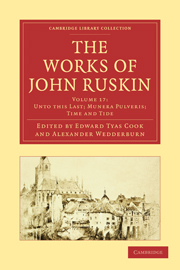Book contents
- Frontmatter
- Contents
- LIST OF ILLUSTRATIONS
- INTRODUCTION TO THIS VOLUME
- PART I “UNTO THIS LAST” (1860)
- PART II “MUNERA PULVERIS” (1862, 1863)
- PART III “TIME AND TIDE, BY WEARE AND TYNE” (1867)
- BIBLIOGRAPHICAL NOTE
- CONTENTS
- PREFACE
- TEXT (WITH ADDITIONAL PASSAGES FROM THE LETTERS IN THE NEWSPAPERS)
- APPENDIX: LETTERS AND PAPERS ON ECONOMIC SUBJECTS 1863–1873
- Plate section
PREFACE
Published online by Cambridge University Press: 05 November 2011
- Frontmatter
- Contents
- LIST OF ILLUSTRATIONS
- INTRODUCTION TO THIS VOLUME
- PART I “UNTO THIS LAST” (1860)
- PART II “MUNERA PULVERIS” (1862, 1863)
- PART III “TIME AND TIDE, BY WEARE AND TYNE” (1867)
- BIBLIOGRAPHICAL NOTE
- CONTENTS
- PREFACE
- TEXT (WITH ADDITIONAL PASSAGES FROM THE LETTERS IN THE NEWSPAPERS)
- APPENDIX: LETTERS AND PAPERS ON ECONOMIC SUBJECTS 1863–1873
- Plate section
Summary
The following Letters were written to Mr. Thomas Dixon, a working corkcutter of Sunderland, during the agitation for Reform in the spring of the present year. They contain, in the plainest terms I could use, the substance of what I then desired to say to our English workmen, which was briefly this:—“The reform you desire may give you more influence in Parliament; but your influence there will of course be useless to you,—perhaps worse than useless, —until you have wisely made up your minds what you wish Parliament to do for you; and when you have made up your minds about that, you will find, not only that you can do it for yourselves, without the intervention of Parliament; but that eventually nobody but yourselves can do it. And to help you, as far as one of your old friends may, in so making up your minds, such and such things are what it seems to me you should ask for, and, moreover, strive for with your heart and might.”
The letters now published relate only to one division of the laws which I desired to recommend to the consideration of our operatives,—those, namely, bearing upon honesty of work, and honesty of exchange. I hope in the course of next year that I may be able to complete the second part of the series, [I could not; but Fors Clavigera is now (1872) answering the same end:] which will relate to the possible comforts and wholesome laws, of familiar household life, and the share which a labouring nation may attain in the skill, and the treasures, of the higher arts.
- Type
- Chapter
- Information
- The Works of John Ruskin , pp. 313 - 314Publisher: Cambridge University PressPrint publication year: 2010First published in: 1905

